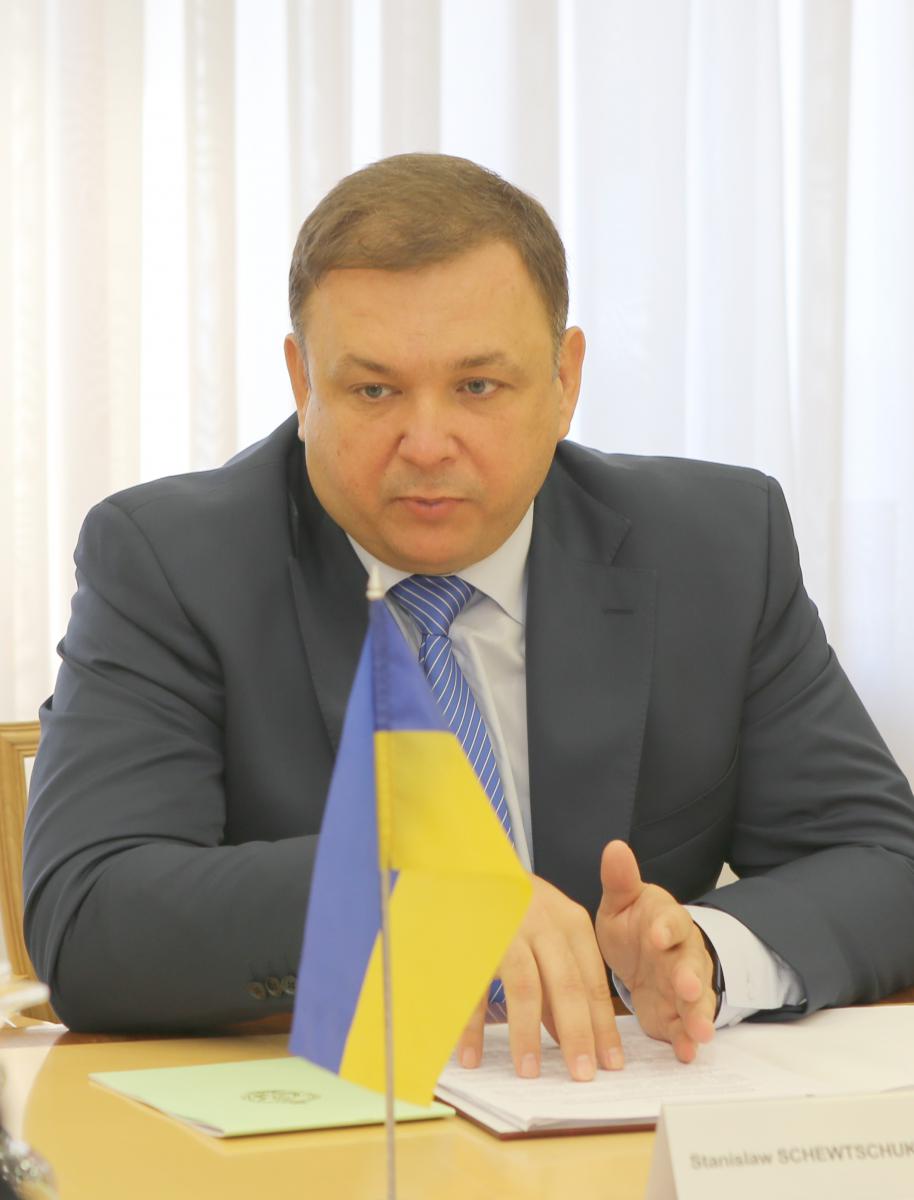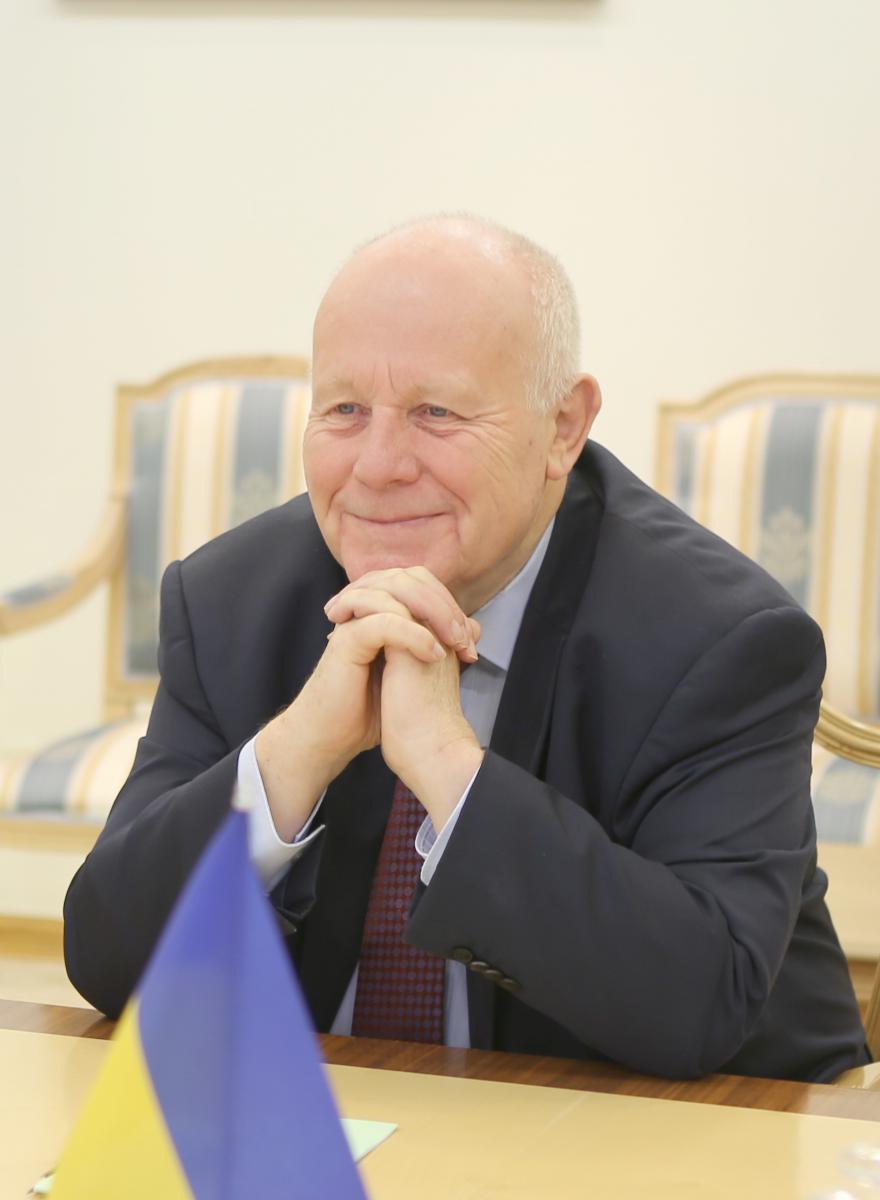Stanislav Shevchuk: Without an authoritative Constitutional Court, there can be no constitutional democracy
21.09.2018
Chairman of the Constitutional Court of Ukraine Stanislav Shevchuk held a meeting with Georg Milbradt, German government’s special envoy for the Ukrainian reform agenda (decentralisation, good governance and public service), retired Minister President of Saxony.
 The meeting was attended by Ambassador Extraordinary and Plenipotentiary of the Federal Republic of Germany in Ukraine Ernst Reichel, referent of the Political Department of the Embassy of the Federal Republic of Germany in Ukraine Raphael Raum.
The meeting was attended by Ambassador Extraordinary and Plenipotentiary of the Federal Republic of Germany in Ukraine Ernst Reichel, referent of the Political Department of the Embassy of the Federal Republic of Germany in Ukraine Raphael Raum.
The Chairman of the Constitutional Court of Ukraine Stanislav Shevchuk greeted guests and noted fruitful cooperation of the Constitutional Court of Ukraine with the Federal Constitutional Court of Germany, the retired judges, and the German Foundation for International Legal Cooperation. “For us, the Federal Constitutional Court is a model, first of all, in ideological and doctrinal aspects, and a beacon, which we are trying to follow in the organisation of work”, highlighted the Chairman.
Stanislav Shevchuk noted that constitutional reform took place in Ukraine, in particular, amendments to the Constitution of Ukraine and a new Law of Ukraine “On the Constitutional Court of Ukraine” were adopted. According to him, the changes that have taken place have considerably strengthened the independence of the constitutional jurisdiction body, as well as increased its responsibility.
According to the Chairman of the Court, an important element of the constitutional reform is the selection of Constitutional Court’s judges on a competitive basis. The speaker mentioned that the day before the Verkhovna Rada of Ukraine appointed two judges of the Constitutional Court of Ukraine under its quota, and stressed that after taking an oath by newly appointed judges, the constitutional control body of the country would function in its complete composition.
Stanislav Shevchuk highlighted that the greatest achievement of th e constitutional reform is the introduction of the constitutional complaint by which the individual was able to directly appeal to the Constitutional Court of Ukraine in order to protect his/her constitutional rights. He noted that the constitutional complaint in Ukraine is not complete, as in Germany, but normative. That is, according to Stanislav Shevchuk, this is a complaint against the law which, in the opinion of the subjects of application, violates their constitutional rights. In this aspect, the German experience in reviewing constitutional complaints is extremely important.
e constitutional reform is the introduction of the constitutional complaint by which the individual was able to directly appeal to the Constitutional Court of Ukraine in order to protect his/her constitutional rights. He noted that the constitutional complaint in Ukraine is not complete, as in Germany, but normative. That is, according to Stanislav Shevchuk, this is a complaint against the law which, in the opinion of the subjects of application, violates their constitutional rights. In this aspect, the German experience in reviewing constitutional complaints is extremely important.
In addition, due to the changes introduced, the Court was given the opportunity to establish in its acts the procedure and terms for their implementation, which is also one of the important results of the reform. Stanislav Shevchuk added that in the Decision on the compliance of the Constitution of Ukraine (constitutionality) of Article 216.6 of the Criminal Procedural Code of Ukraine, the Court postponed the loss of validity of the unconstitutional norm and gave the legislator three months to resolve this issue.
However, in the Court’s Decision on compliance with the Constitution of Ukraine (constitutionality) of the Law of Ukraine “On All-Ukrainian Referendum”, the Court went another way by declaring it unconstitutional in general. The law has expired since the adoption of the relevant decision. “We deem that this Law violated such democratic principles that it was urgently necessary to remove it from the legal field of the state,” the speaker stressed. According to the Chairman of the Constitutional Court, during the adoption of the Law, the procedure for its consideration and approval was violated, and there were serious risks for constitutionalism, in particular, it was foreseen the possibility of adopting a new Constitution of Ukraine or changes to the current Constitution at a referendum without the procedure provided for by the Constitution.
The task of the Constitutional Court is to defend the Constitution of Ukraine as an Act of the highest legal force, Stanislav Shevchuk emphasised. He noted that today the Court faces an extremely difficult task – to strengthen respect for the body of constitutional control of the country. “After all, without a strong Constitutional Court there can be no constitutional democracy,” summed up the Court’s Chairman.
Responding to the questions regarding the implementation of the decentralisation reform, the Chairman of the Constitutional Court noted that the Constitutional Court of Ukraine had given a positive Opinion on the  compliance of the draft law on amendments to the Constitution of Ukraine on decentralisation of power (Reg. No. 2217a) to the requirements of Articles 157 and 158 of the Constitution of Ukraine in 2015. Thus, the Constitutional Court of Ukraine opened the way for decentralisation of power in Ukraine.
compliance of the draft law on amendments to the Constitution of Ukraine on decentralisation of power (Reg. No. 2217a) to the requirements of Articles 157 and 158 of the Constitution of Ukraine in 2015. Thus, the Constitutional Court of Ukraine opened the way for decentralisation of power in Ukraine.
However, Stanislav Shevchuk noted, the changes to the Constitution of Ukraine on decentralisation were not approved by the Verkhovna Rada of Ukraine, and the Government had begun reform within the framework of the current Constitution of Ukraine. He drew attention to the fact that financial decentralisation has already been taken place in Ukraine as well as the process of voluntary association of territorial communities continues. By the beginning of 2018, 831 united territorial communities were established, of which 126 are waiting for the election, the Chairman of the Court informed.
Georg Milbradt, German government’s special envoy for the Ukrainian reform agenda stres sed that the reforms taking place in Ukraine indicate that the country was leaving the Soviet Union’s traditions. The changes are not very fast, stressed the speaker, because they should happen not only at the level of laws, but also at the level of thinking. In his opinion, the Constitutional Court of Ukraine, as one of the key institutions of the country, contributes to its reform.
sed that the reforms taking place in Ukraine indicate that the country was leaving the Soviet Union’s traditions. The changes are not very fast, stressed the speaker, because they should happen not only at the level of laws, but also at the level of thinking. In his opinion, the Constitutional Court of Ukraine, as one of the key institutions of the country, contributes to its reform.
Georg Milbradt stressed that Germany follows the decisions of the Constitutional Court, and the recent ones are very persuasive, in particular, that on on the referendum. He added that he shares the position of the Constitutional Court of Ukraine with regard to the necessity of adopting a new Referendum Law. According to him, the Federal Constitutional Court of Germany in such cases has the authority to adopt temporary provisions.
The speaker noted that in Ukraine, not all ideas of reform were reflected in the Basic Law, in particular, on decentralisation. The legislator has to implement the relevant changes only at the level of normative legal acts, since the Constitution of Ukraine had not been amended, he highlighted. So far, this system is in place, but without changes to the Constitution the desired result will not be achieved, Georg Milbradt emphasised. In his view, such issues as changes to the constitution are immediate and urgent.
During the meeting, the interlocutors discussed other relevant issues and expressed their hope for further fruitful cooperation.


